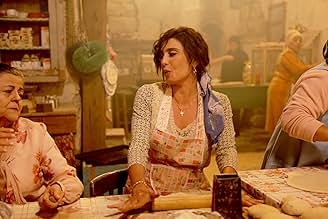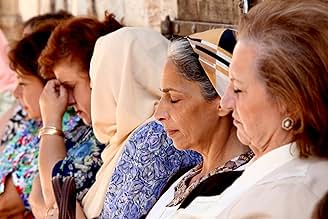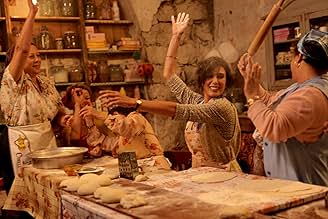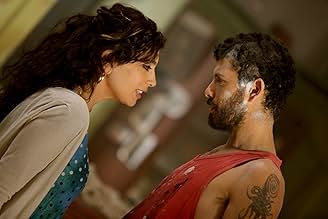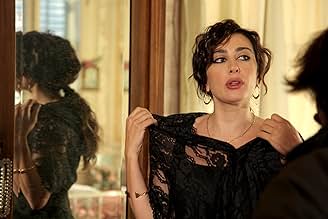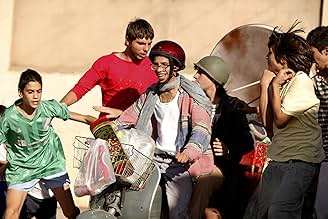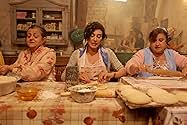Adicionar um enredo no seu idiomaA group of Lebanese women try to ease religious tensions between Christians and Muslims in their village.A group of Lebanese women try to ease religious tensions between Christians and Muslims in their village.A group of Lebanese women try to ease religious tensions between Christians and Muslims in their village.
- Direção
- Roteiristas
- Artistas
- Prêmios
- 9 vitórias e 5 indicações no total
- Abou Ahmad
- (as Mohammad Akil)
Avaliações em destaque
And then comes Nadine Labaki's new movie: Where Do We Go Now, with its Lebanese title: W Halla2 La wein (also in French: Et Maintenant, On Va Ou?) The premise of the movie is quite simple – and for many Lebanese, worry-inducing for fear of overuse of clichés. The overall basis of the plot is the coexistence of Lebanese Muslims and Christians in one community, sometimes peacefully and other times not. Many, like yours truly, felt the issue was overdone. Maybe not in cinema but in everyday life. Most of us are sick of being bombarded with commentary about the struggles that face our very diverse community. But this is not the case in Where Do We Go Now.
An unnamed village during the later part of the 20th century has its only connection with the outside world in the form of a very rudimentary bridge, around which land-mines had been planted and never removed. Even TV reception is very poor to the village and the movie begins with a few youngsters searching for a broadcast signal to set up a TV night for the town-folks. This village is also a religiously divided community where the Church and the Mosque are only a house apart. And more often than not, the people live together happily. But as it is, and despite barely having any access to news from the outside world, the men of this village start to confront each other in violent ways. Little things that would pass unnoticed cause them to explode, signaling the anger they've been bottling in. And it is then that the few women of the village start to devise plots to keep the men busy, entertained and get their minds off being violent. These plans will vary from fake miracles to putting hashish in cakes. But these women will go to every measure possible and break every limit imposed on them by society to keep their town together. And it is for these women, representing a vast majority of our Lebanese mothers, that this movie is so aptly dedicated.
Nadine Labaki, director of the movie and starring as Amal, is astonishing as always. You, really, cannot see her eyes on screen and not be mesmerized. She's simply entrancing, even when she doesn't speak. Then how about when she delivers a tour de force performance as one of those women, who happens to be in love with a man from the town's other religion. But to be perfectly honest, the accolades one ought to give Labaki are not for her acting but for her directing. Never have I imagined a Lebanese movie can turn out this good and she makes it seem effortless. Her camera shots, her focus on details, her keen eye all of this combine to give you a cinematic experience that will entrance you. This movie, like Caramel, features mostly unknown faces and all of them deliver as well. It is hard to believe – and yet in retrospect so evident – that such acting can come out of common people that we all meet on the street.
Where Do We Go Now is a movie of such epic proportions that these "unknown" actors and actresses (mostly actresses) deliver performances that are so subtly nuanced, so exquisitely flavored and so astonishingly well-done that they would put the best actresses and actors of Hollywood to shame. Yes, I have said it. The score of the movie is chilling and haunting and wonderfully executed by Nadine's husband Khaled Mouzanar. The movie also features a few highly intelligent songs, written by Tania Saleh. And let's talk about the script. What an ingenious way to tackle the subject at hand. Not only did Nadine Labaki not fall to any cliché known to us as a Lebanese community, but she managed to introduce them in a subtle comical way that would make us laugh at ourselves for uttering or doing them in the first place.
The script is so strong it will turn you bipolar. Yes, lithium is advised to be taken at the door while going in. Why? Never have I laughed so hysterically one moment and just wanted to cry the other. And then after being utterly devastated, it brings you back to laughter. The movie plays with you like a ping pong ball. And you cannot but love every moment of it.
I was talking to my friend the day before we went to watch Where Do We Go Now, which happened to be the day it won the People's Choice Award at the Toronto Film Festival, and she said: "I'm very cautiously optimistic about this. I'm not letting my expectations overreach because I don't want to be disappointed." Well, I'm pretty sure she agrees with me on this: Where Do We Go Now brings out things in you that you didn't even know you had. It brings out the best in you, as a Lebanese, sitting in that cinema chair for ninety minutes. And you need the best of the best to do that. Nadine Labaki, you deserve more than the few minutes of applause the people in the movie theater gave you. You deserve a full blown standing ovation. You have done the impossible. Again. Lebanese cinema has no excuse but to overreach for excellence now. And this movie deserves an Oscar win. Cheers to our mothers.
The next category you'll find in Where Do We Go Now? Is comedy, which dominates a large part of the first act and is also sprinkled throughout the rest of the film. I was so charmed by the group of scheming wives who are trying to find ways to subtly control the men of the village. Then there are the Ukranian dancers who add another element of humor to the film which I found surprisingly delightful. But at the heart of the film is a dramatic story that echoes the actual political conflict that has plagued the Middle East for millennia. I was mesmerized by this entire story and how even in this remote village there is a constant threat of aggression taking hold and leading the people to violence. On the one hand you feel the general frustration with the fact that these two groups can't maintain peace, but on the other hand you can see how one small act confirms all their prejudices and snowballs into disaster. Where Do We Go Now? Is a marvelous movie that made me laugh and cry multiple times, which shows just how effective its emotional story is told.
The movie premiered at the Cannes Film Festival, and won the people's choice award at the Toronto International Film Festival. Nadine, who also acts in the film, may be accused by some quarters of trivializing the conflict between the Abrahamic faiths with her comic take on religion, complete with a climax reminiscent of a Cheech and Chong flick. However, the tone of the film remains somber throughout, and the viewer is often reminded of the toll of the conflict on both sides of the religious divide, with glimpses of intermittent sectarian strife.
The intelligent dialogue, interspersed with repartee between the female characters is refreshingly entertaining, offering a peek inside the (mostly) segregated Arab society and humanizing a population segment often portrayed as meek and subservient to the other sex.
Nadine's second directorial venture after Caramel continues to court controversy, with an ending which Labaki acknowledges might "raise a lot of polemics. It might upset people who are a bit fanatic or too conservative..." By the end of the film, Nadine is sure to rouse some thought-provoking questions in the viewers mind, fulfilling the obligation to her craft and pushing the envelope. Where Do We Go Now has been chosen as the Lebanon's 2011 entry in the best foreign language film category for the Academy Awards.
The script is a gem. The team of writers, including director and co-star Nadine Labaki, is just great. It pulls us from comedy through tenderness and tragedy. The acting troupe is very good, very believable. It seems to be shot on location, sets are real enough to make you believe you are there.
The cinematography is great, really showing the town as it is, and placing you very much in the middle of the scenes. Nice lighting, color balance is warm and soft, giving a very homey look to the locations.
It's all too seldom that we who are not in the middle of a internal civil war such as this get to see a window into the world that is trying to hang on to it's sanity, not yet having fallen over the precipice into full scale chaos.
This is a very wonderful, funny, and poignant window into that world, told by people who are very close to the real situation. It could not have been invented by a California filmmaker.
It falls into the classes of films like "The Debt" and "of Gods and Men", stories of middle eastern conflict that are not set pieces, or play to western stereotypes of what is happening there, though it is much 'lighter' and less of a drama than those. This has much more light hearted nature than those films.
9 stars out of ten, for wonderful original storyline, wonderful unknown cast, good acting, great cinematography, nice weaving of humour and pathos, contemporary story, without being trite, solid editing. Also just a good movie, beyond all the technical nonsense.
So if you have read this far, saw those other films, and liked them, you likely will like this better. Again, hard to imagine you will be disappointed in this gem.
Você sabia?
- CuriosidadesThe highest grossing Arabic speaking release in the territory of Lebanon.
- Citações
[first lines]
Amale: [narrating] The story I tell is for all who want to hear. A tale of those who fast, a tale of those who pray, a tale of a lonely town, mines scattered all around. Caught up in a war, split to its very core. To clans with broken hearts under a burning sun. Their hands stained with blood in the name of a cross or a crescent. From this lonely place, which has chosen peace, whose history is spun of barbed wire and guns.
- ConexõesFeatured in Fokus på Film fra Sør (2011)
- Trilhas sonorasDanse Funèbre
Written by Khaled Mouzanar
Performed by Khaled Mouzanar
Principais escolhas
- How long is Where Do We Go Now??Fornecido pela Alexa
Detalhes
- Data de lançamento
- Países de origem
- Centrais de atendimento oficiais
- Idiomas
- Também conhecido como
- Where Do We Go Now?
- Locações de filme
- Empresas de produção
- Consulte mais créditos da empresa na IMDbPro
Bilheteria
- Orçamento
- US$ 6.700.000 (estimativa)
- Faturamento bruto nos EUA e Canadá
- US$ 531.997
- Fim de semana de estreia nos EUA e Canadá
- US$ 15.382
- 13 de mai. de 2012
- Faturamento bruto mundial
- US$ 7.507.008
- Tempo de duração
- 1 h 50 min(110 min)
- Cor
- Mixagem de som
- Proporção
- 2.35 : 1


